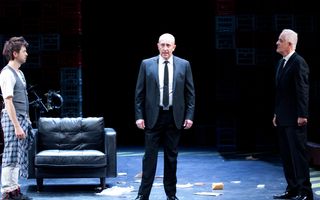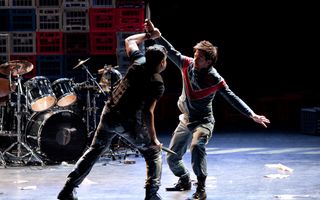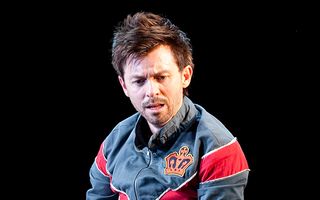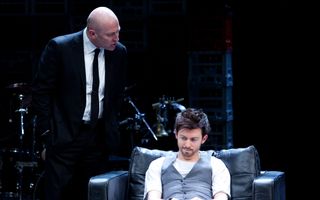 On Stage
On Stage
King Henry IV
No more the thirsty entrance of this soil
Shall daub her lips with her own children's blood...
Act 1, Scene 1
King Henry IV is the English ruler and father of Prince Henry (Hal). No matter how hard he tries King Henry IV cannot escape the guilt and the fear of a lack of legitimacy that comes with being a usurping ruler. There is a sense that he knows unrest is inevitable at the start of the play when he is making an attempt to unite the country (and atone for the murder of his cousin) behind a crusade to the holy land. Henry’s claim to the throne is really no stronger than that of Richard II, so he is desperate to achieve some sense of moral legitimacy to rule. He is infuriated, but could hardly be surprised, that he faces rebel uprisings, and border skirmishes with the Welsh and the Scots. In the midst of all of this he is negotiating a rocky relationship with his rebellious and seemingly degenerate son, who stands to inherit the already vulnerable English throne.
Henry prides himself on his aloofness, and his determination to maintain his presence “like a robe, pontifical” (Act 3, Scene 2). He is appalled at the idea that Hal would behave in such a way as to become ‘familiar’ in the eyes of common citizens. In fact, some of his most scathing criticism of his son comes in the form of comparison to Richard II who “Mingled his royalty with capering fools” (Act 3, Scene 2). It is this same aloofness and stubborn resolve however that only inflames the conflict between Henry and the Percies, and ultimately Prince Hal proves himself to be a far more cunning leader than either his father or his uncle.
At the end of the play there is no doubt immense satisfaction for King Henry. His main adversary has been gloriously defeated and Hal, his once ‘delinquent’ heir has returned to the fold. There has been no great revelation or transformation for Henry, however and he remains beset by unrest and at the end of the play is still no closer to his crusade.
Prince Harry (Prince Hal)
My reformation, glittering o'er my fault,
Shall show more goodly and attract more eyes
Than that which hath no foil to set it off.
Act 1, Scene 2
Prince Henry (Hal) is the son of King Henry IV and heir to the English throne. In a play that is more a Henry V origin story than anything to do with the title character, Prince Hal quickly establishes himself as the play’s protagonist. As the Prince of Wales and eldest son of Henry IV, he is man on the verge of great transformation. Initially we see him in a state of indulgent rebellion, carousing recklessly with drinking buddies, planning highway robbery pranks, and nihilistically turning his back on all authority and courtly responsibility. It is worth remembering that King Henry V was, and still remains, one of England’s most revered royals. So for Shakespeare to introduce Prince Hal to his audience as a drunken delinquent not only audaciously subverted their expectations, but was a stroke of theatrical brilliance in terms of the potential for a character arc and a transformation that is denied his father, even as the titular character. This is tinged, however, with the niggling feeling that we as the audience are being played by Hal. The audience barely has time to get their bearings at the start of the play before Hal assures us “I know you all” (Act 1, Scene 2) and that everything we are seeing is part of a secret scheme to manipulate his own image. If there is one thing that this king-to-be is expert at that his predecessors lacked, it is an awareness of ‘brand’. Hal tells us that this “loose behaviour” is all an act to ensure that when he reveals his true self, he will be even more loved. This Machiavellian edge to the Prince resonates throughout the rest of the play (and indeed the next two in the tetralogy) as we are forced to ponder what moments are the real Hal, and what moments are part of the act. One cannot help but have some sympathy for those that are caught up in Hal’s charade. In Act 3 when King Henry gives his son a lesson in leadership and Hal promises to reform, is he genuinely chastened or does he simply know how to say exactly what King Henry wants to hear? Falstaff also, for all his own scheming and misdirection, finds himself on constantly shifting ground with Hal. In Act 4 Scene 2, we get a chilling preview of Hal’s ultimate denial of Falstaff when Hal, in a performance, while impersonating his father, promises to banish his old “friend.” Early in the play we glimpse the great king-to-be; the Hal that will soon reveal his inner ambition and “glittering” reformation. While the great wit, Sir John Falstaff, proves something of a mentor, tutoring the young Hal on the impractical aspects of heroism and honour and indulging in much debauchery, Hal eventually turns full circle to surprise his critics and the expectations of a disappointed father, Henry IV, as he becomes the “war-like Harry” we meet in Henry V.
Falstaff (Sir John Falstaff)
Can honour set-to a leg? No. Or an arm? No. Or take away the grief of a wound? No... What is honour? A word.
Act 5, Scene 1
Falstaff is an old knight, and Hal’s close companion and sometime mentor. His character is overflowing with flaws, yet he has remained an audience favourite and is considered one of Shakespeare’s greatest creations. He is what any parent might term a ‘bad influence’ on their child, and at the opening of the play we see that Hal has spent far too much time drinking and carousing with Falstaff than his father, King Henry, would like. Falstaff is manipulative, dishonest, corrupt, cowardly, a thief, a prankster, selfish, often drunk, and lazy. He is also witty, roguish, affable, fun, and loves Hal and his friends dearly. It is these qualities bundled together that make him irresistible to the audience and to his friends, despite the fact that their patience runs thin with him from time to time. In a play full of contrary and ambiguous characters, Falstaff is a stand-out. We are simultaneously appalled by his apparent lack of conscience and morality, envious of his hedonistic decadence, and floored by his insights into human nature. An aristocrat, and indeed a Knight, Falstaff seems the very definition of hypocrisy as he lives a life of decadence afforded him by the very system for which he claims to have total disdain. He is incapable,or perhaps unwilling, to act and serve his title and shows full-throttled disregard for all that is courtly and chivalric. However, he was, and remains, a crowd favourite, and the pang of anguish we feel at his treatment at the hands of Hal (particularly the “make believe” promise of banishment) is palpable. Falstaff stands as a clear foil to King Henry as an alternate father figure for the young Prince Hal. His resolve to enjoy life through a complete commitment to impulsive and indulgent recklessness is in direct contrast to the aloof, courtly, “pontifical” approach of the King. Despite his obviously unhelpful inclination towards boozing, eating, and stealing, we are still left to ponder whether Prince Hal could ever have become the precociously gifted communicator and leader of men, Henry V, without the influence of Falstaff. Falstaff was in Shakespeare’s time, and remains to this day, a crowd favourite. Probably a combination of a real-life companion of Prince Hal and an unkind portrayal of one or two of Shakespeare’s fiercest critics, Falstaff may be the first recorded example of a popular character spawning a spin off. Such was Falstaff’s popularity, Shakespeare paused in his writing of Henry IV Part 2 to quickly write the comic vehicle The Merry Wives of Windsor specifically, it seems, to cash in on the appeal of this quintessential rogue.
HENRY "HOTSPUR" PERCY
While you live, tell truth and shame the devil!
Hotspur, Act 3, Scene 1
Hotspur is the the son and heir of the Earl of Northumberland, and Hal’s opponent in battle. Named Henry Percy, he earns his nickname ‘Hotspur’ because of his impetuosity and fierceness in battle. A valiant warrior, he is the hot-headed member of the Percy family, in part responsible for bringing Henry IV into power through the defeat of the Scots at Holmedon. In the eyes of Henry IV he is the very “theme of honour’s tongue” (Act 1, Scene 1). Hotspur is a talented and passionate soldier with leadership qualities that King Henry can only hope to see in his son, Prince Hal. In fact, King Henry says that he is jealous of Northumberland, for having such a son as Hotspur. The notion of honour in leadership and conquest is at the heart of Hotspur’s character, and although quick-tempered and impatient, his obsession with honour and glory make up the core of his volatile persona. Even in light of Hotspur’s rebellious uprising against King Henry, the play never portrays him as a villain and often makes it difficult to know whether or not he is actually suited to govern the kingdom. Hotspur stands as the epitome of masculinity in Shakespeare’s play and contributes largely to its exploration of loyalty, leadership, honour and power.
LADY KATE PERCY
Lady Percy is Hotspur’s wife. Often neglected by her husband, Lady Kate has much to contend with but proves herself to be a witty, supportive and patient partner in light of her husband’s questionable commitment to marital affairs. She shows deep concern about her husband’s part in the rebellion and confronts him on his keeping of secrets. She is often responsible for moments of playfulness and warmth with her husband, amidst the growing rebellion and political pressures.
EARL OF WESTMORELAND
Westmoreland is King Henry’s closest and most valuable ally. He is a loyal nobleman and military leader. Throughout the uprising against Henry, he stands in steadfast commitment to the King’s rule, fighting against those who oppose him, and eventually setting out to capture the remaining rebels.
POINS, BARDOLPH, and PETO
As friends of Falstaff and the young Prince Harry, Poins, Bardolph and Peto make up the collective group of highwaymen, criminals and tricksters that frequent the Boar’s Head tavern. They are true representatives of the commoners and the ruffians in the world of the play.
MISTRESS QUICKLY
Mistress Quickly is the hostess of the Boar’s Tavern which Falstaff and Hal frequent. Much like Falstaff, Misstress Quickly is associated with the raucous and debaucherous world of drinking and hedonism. As hostess of the establishment and as one of the few female roles in theplay, she makes her mark as an embodiment of the play’s rebellious spirit. Like Falstaff she stands in direct contrast to the courtly world of Henry, the Percy family, and the other noblemen.
EARL OF NORTHUMBERLAND (Henry Percy)
Northumberland is the father of Hotspur and one of the main members of the rebellion against King Henry IV. Northumberland plays a significant role in helping King Henry to the throne that was once occupied by Richard II. However, disgruntled with Henry’s abandonment of Mortimer, Northumberland is prompted towards the inevitable uprising. His character, both as leader and father, is brought into question. When under pressure, he tends to abandon family and responsibility.
EARL OF WORCESTER (THOMAS PERCY)
Worcester is the uncle of Hotspur and brother of Northumberland. He is the mastermind behind the Percy rebellion against King Henry. Both manipulative and shrewd, he is eager to see the fall of Henry at the hands of his nephew and the Percies, and to strengthen the alliance between the rebel armies. Deliberately manipulative towards the headstrong Hotspur, he denies his nephew the knowledge of King Henry’s generous terms of peace towards the rebels, spurring the opposing forces towards the Battle of Shrewsbury.
ARCHIBALD, EARL OF DOUGLAS
The Earl of Douglas is a Scottish rebel who joins the Percy family in their uprising against King Henry. A brutal and courageous warrior, he is captured by Henry’s forces at the Battle of Shrewsbury, but later released and commended for his bravery and honour as demonstrated on the battlefield.
SIR RICHARD VERNON
Vernon is a close associate with the Earl of Worcester, and part of the rebellion against King Henry. Along with Worcester, he deceives Hotspur, denying information of King Henry’s call for peace, leading towards the Battle of Shrewsbury.
HUMPHREY OF GLOUCESTER
Gloucester is the younger son of King Henry and brother to Hal.





